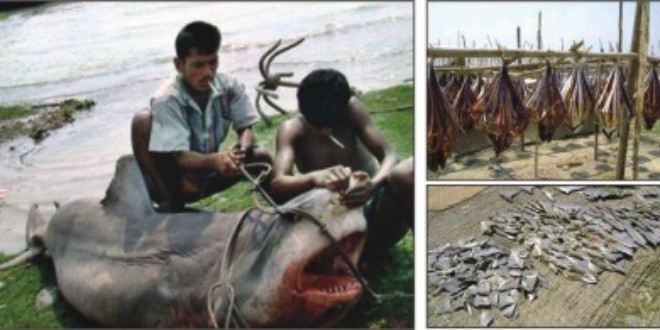Indiscriminate shark catching continues in the coastal areas to the south of Patuakhali and Barguna districts defying ban and threat to ecology in the Bay. With more and more fishermen and traders getting involved in the “lucrative business”, some 250 trawlers with around 2,000 fishermen are now engaged in netting sharks in coastal areas and in the deep sea during the peak season from December to April.
Schools of sharks are seen in the shallow waters during the period, said marine resources experts and fishermen.
Shark catching is banned under the Forest Act but authorities are doing little to check the callous act.
Fishermen use a special type of net to catch smaller sharks in large numbers, they said.
With the rampant poaching of sharks, at least 50 centres in Kuakata, Sonar Char, Ruper Char, Fatrar Char, Char Gongmoti in Patuakhali and Asar Char, Pathorghata areas in Barguna district are now being used for drying sharks and its trade, said fish trader Zakir Hossain, who came to Kuakata from Chittagong.
Shark fin, often used to prepare an expensive and special type of soup, has high demand in rich countries.
Dried shark is supplied to different areas of the country while a large part of netted sharks is allegedly smuggled to Myanmar and Bangkok through the Bay, sources said.
Sharks have good markets in Middle East and European countries where its skin, teeth, bones and stomach are sold for high prices.
The skin is used for making fashionable leather goods like money bags, vanity bags, ornaments keeping bags, and shoes. Teeth and bones are used for making ornaments for women while oil extracted from shark is used as medicine.
Their bowels are used as feed for fish and poultry.
A section of traders from Chittagong encourage fishermen in the southern areas to net shark.
More and more fishermen are being attracted to shark catching as it is more profitable than catching other varieties of sea fish, said Abdus Salam Howlader, president of Fishing Trawlers Owners Association.
“Sharks help to maintain balance in marine resources as they eat fast growing varieties of small fishes and check their disproportionate increase. In this way sharks create more space for big sea fishes to live. Indiscriminate shark netting will create imbalance in marine resources,” Pijush Kanti Hori, former chairman of Zoology Department of Patuakhali Government College, said.
If the balance is lost, fishes will be attacked with various diseases while sharks will move away from Bangladesh water territories, he said.
The authorities should take steps to check indiscriminate netting of sharks to maintain balance of sea resources in Bangladesh coastal waters, experts said.
On February 7 last year, Coastguards and officials of East Wing of Sundarbans Forest Division recovered eight dead sharks of rare species from four trawlers at Dublarchar in the Sundarbans.
But no such drive against shark catching is seen this year.
(From thedailystar.net, Bangladesh, India, by )
 Ocean Sentry
Ocean Sentry




